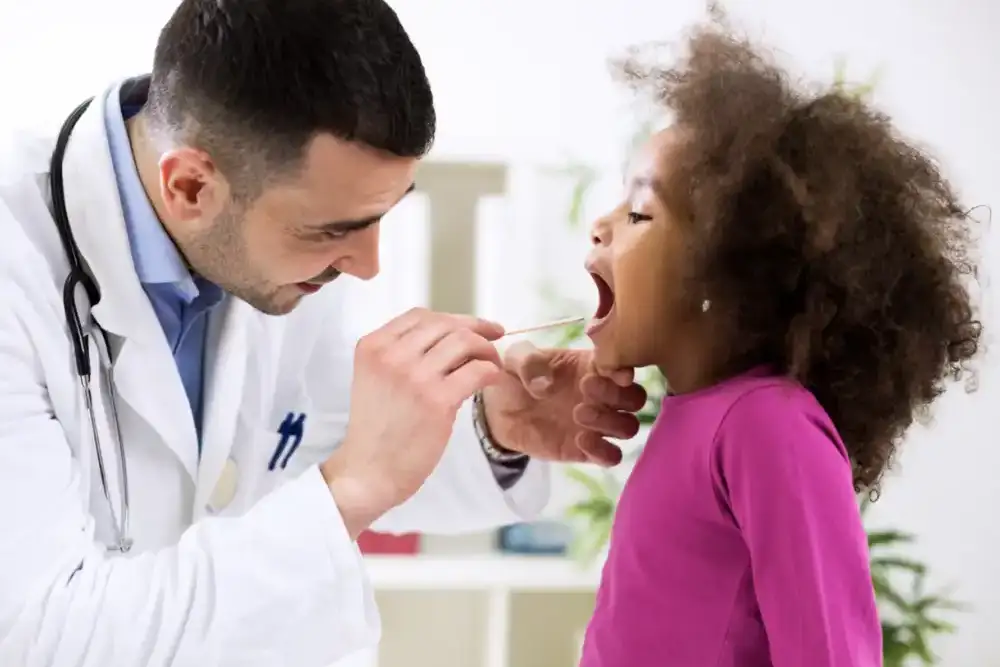Lots of Strep Throat, Not Enough Antibiotics: What Parents Can Do

At East Portland Pediatrics, we’ve seen a lot of families struggling with strep throat this season. Cases remain at high levels and unfortunately, there’s a nationwide shortage of the antibiotic commonly used to treat it in kids.
Here’s what you can do to make sure your child gets the treatment they need.
Strep Throat Symptoms and Treatment
Strep throat is an infection caused by a bacteria known as Group A streptococcus. It’s a common infection that typically affects school-aged children, although adults can also get it.
Common symptoms of strep throat include sore throat and fever. In some cases, the infection can also cause headaches, nausea, and vomiting.
Strep is usually treated with antibiotics to avoid complications and minimize the likelihood of infecting others. Rest, hydration, and medication to help with the pain are also important.
Strep throat is contagious, and children with strep throat should stay home from school until they have had at least two doses of antibiotics that are 12 hours apart, their fever is gone, and they are feeling better.
Other Infections Caused by Group A Strep
While strep throat is the most common infection caused by this bacteria, we are also seeing an increase in other infections as well. Group A Strep is a common cause of skin infections, from impetigo to cellulitis.
What is most worrisome is the increase in invasive strep infections seen in the US and other countries. These invasive infections are medical emergencies that require immediate medical attention. Invasive infections include sepsis, necrotizing fasciitis, and streptococcal toxic shock syndrome. If your child is severely ill, weak, unable to sit up, or having severe breathing trouble, call 911.
Shortage of Amoxicillin
The antibiotic we usually use to treat strep in kids was added to the FDA’s list of drug shortages in October 2022. Luckily, this shortage is limited to pediatric versions of amoxicillin — liquid products that are easier for kids to take than pills. The shortage affects multiple generic brands, but not every amoxicillin product or strength.
While some parents may need to call around if their pharmacy doesn’t have the specific product they need, pharmacists should be able to share information on which other pharmacies have it in stock. Switching to another type or strength of antibiotic may be necessary. And yes, you might need to help your child take a pill instead of swallowing a liquid.
Avoiding and Managing Strep Throat
Good hygiene helps to prevent strep and keep it from spreading:
- Wash hands often
- Keep kids home when sick
- Cover sneezes and coughs
- Don’t share drinks or toothbrushes
Parents and caregivers should be vigilant about managing strep throat during this season, and keep in mind that other respiratory illnesses can complicate the picture. Finish the entire course of antibiotics prescribed by your pediatrician, even if your child starts to feel better before the medication is gone.
East Portland Pediatrics
It can be stressful when your kids get sick, and more so when you can’t get the medicine you need right away. Your pediatrician can help answer questions and provide guidance about the best ways to manage strep throat and other illnesses during this season.
While liquid amoxicillin is the preferred treatment for strep, alternative antibiotics are available. Your pediatrician can work with you to determine the best course of treatment.
If your child displays symptoms like a sore throat that develops very quickly, swollen tonsils (sometimes with white patches), red spots on the roof of the mouth, and/or swollen lymph nodes, call us to make your appointment. We’ll get you the help you need.
